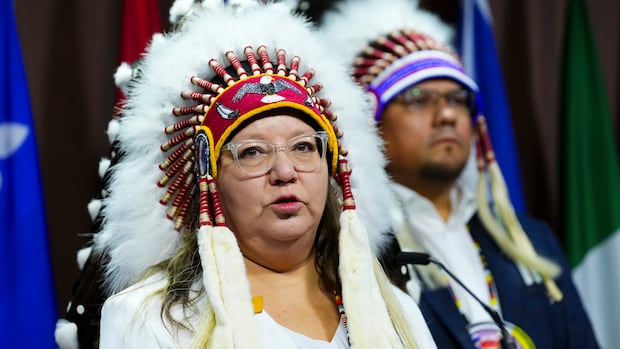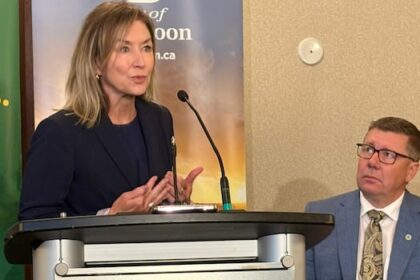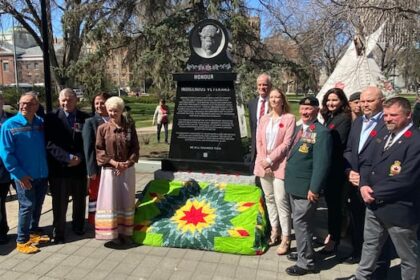IndigenousIndigenous leaders and housing organizations are eager for the federal government to deliver on the $2.8 billion over 3 years promised in the budget to the Urban, Rural and Northern Indigenous Housing program. Budget 2025 recommitted $2.8B over 3 years for Urban, Rural and Northern Indigenous HousingListen to this articleEstimated 5 minutesThe audio version of this article is generated by text-to-speech, a technology based on artificial intelligence.Assembly of First Nations National Chief Cindy Woodhouse Nepinak, left, and Willie Moore Regional Chief for Manitoba, hold a news conference on Parliament Hill in Ottawa on Sept. 16. (Sean Kilpatrick/The Canadian Press)Indigenous leaders are concerned about when communities will see money pledged in the federal budget for urban, rural and Northern housing.Assembly of First Nations National Chief Cindy Woodhouse Nepinak said it needs to be distributed directly to communities as soon as possible.”It’s disheartening to see that the last couple of years First Nations have been asking and not getting,” Woodhouse Nepinak told CBC Indigenous.On Tuesday, the federal government released its first budget since Mark Carney became prime minister. Indigenous Services Canada and Crown-Indigenous Relations face two per cent cuts, equaling about $2.3 billion by 2030, to their department budgets.WATCH | Carney budget cuts Indigenous departments’ spending by 2%:Carney budget cuts Indigenous departments’ spending by 2%Indigenous communities can expect nearly $2.3 billion in spending cuts over the next four years with limited new spending for clean drinking water, consultations on major projects and Arctic infrastructure like airports, seaports and roads.The budget also saw the federal government recommit to $2.8 billion over three years for the Urban, Rural and Northern Indigenous Housing program.This is the amount of funding that remains from the $4.3 billion over seven years first announced in the 2022 and 2023 budgets.So far, $300,000 went to the National Indigenous Collaborative Housing Incorporated (NICHI) to help co-develop and launch the Urban, Rural and Northern Indigenous Housing Strategy and $1.2 billion was distributed “to distinctions-based government/partners to support members, citizens and beneficiaries” living in urban, rural and Northern areas.The Ministry of Housing and Infrastructure said in a statement funding has been extended to the 2030-2031 fiscal year. Initial agreements in place with distinctions-based partners, the ministry said, are supporting housing needs through “planning and building new housing, renovating and retrofitting existing housing, or providing rent subsidies and related housing services.”Indigenous Services Canada Minister Mandy Gull-Masty told CBC Indigenous she will be working closely with the housing minister and other ministers to “co-ordinate and align ourselves to respond to the needs of housing” for Indigenous communities.Indigenous Services Minister Mandy Gull-Masty rises during Question Period on Parliament Hill in Ottawa on Wednesday. (Adrian Wyld/Canadian Press)Gull-Masty also said how funding will be delivered will involve Indigenous leadership to decide “where the direction is going to come from.”In January 2024, CMHC launched a request for proposals for a national housing centre to deliver the remainder of funding — as was identified in the strategy — but no organization has been named to date.$2M in shovel-ready projectsNational Indigenous Collaborative Housing Incorporated (NICHI) chief executive officer John Gordon said the organization is well positioned to help communities deliver housing.”There’s been talk about the provincial, federal and municipal governments trying to align their efforts in addressing the housing crisis,” Gordon said.”Local Indigenous housing providers, members of NICHI, have been able to do this for years. They have the experience and expertise to deliver. We need to put money in their hands to allow them to deliver on the priorities for their communities.”John Gordon is the chief executive officer of National Indigenous Collaborative Housing Incorporated (NICHI). (Submitted by NICHI)The organization works with First Nations, Metis and Inuit urban, rural and northern organizations across the country to deliver housing needs.In June 2023, NICHI was provided $281.5 million in federal funding to address critical housing needs and identified 447 housing projects with over $2 billion needed in funding.In March, the organization announced it had distributed $275.2 million of that funding to 74 Indigenous-led housing projects across the country, delivering 38,000 units of housing.Gordon said the organization has identified an additional $2 million in “shovel-ready” housing projects it is ready to support, it just needs the funding.”[We’re] hoping to be able to get money in the hands of communities that desperately need this funding, especially as we head into an economic downturn,” Gordon said.Need for distinctions-based fundingThe federal government said Indigenous communities will also be eligible for the Build Canada Homes fund, which was allocated $13 billion over five years.The program does not specify funding for Indigenous communities, though Woodhouse Nepinak said she has been asking the housing minister to ensure there are specific carve outs for First Nations.”We end up getting sidelined because we have to go to the minister and ask for ministerial loan guarantees and it’s very complex when it’s on First Nations communities,” she said, adding she would be meeting with the minister in the days ahead.In September, the federal government announced the Nunavut Housing Corporation would be Build Canada Homes’ primary partner in Nunavut.Inuit Tapiriit Kanatami President Natan Obed said he hopes to work with the federal government in a distinctions-based way when it comes to housing and implementing funding for housing.”We’ve worked in partnership with the Government of Canada to build homes and communities and to do what we can to ensure that there are more options for housing across Inuit Nunangat,” Obed said.Métis National Council President Victoria Pruden said they were encouraged by the housing measures in the budget.”We’ve had a lot of outreach and good discussion in terms of Build Canada Homes and what that means in terms of dedicated funding streams for Métis housing,” Pruden said.ABOUT THE AUTHORJoy SpearChief-Morris is the recipient of the 2025 CJF-CBC Indigenous Journalism Fellowship. She is an Indigenous Black journalist and member of the Kainai Blood Tribe in Alberta. Joy has had bylines in The Globe and Mail, The Narwhal, The Walrus, The Toronto Star, CBC and Sportsnet.
Thursday, 5 Mar 2026
Canada – The Illusion
Search
Have an existing account?
Sign In
© 2022 Foxiz News Network. Ruby Design Company. All Rights Reserved.
You May also Like
- More News:
- history
- Standing Bear Network
- John Gonzalez
- ᐊᔭᐦᑊ ayahp — It happened
- Creation
- Beneath the Water
- Olympic gold medal
- Jim Thorpe
- type O blood
- the bringer of life
- Raven
- Wás’agi
- NoiseCat
- 'Sugarcane'
- The rivers still sing
- ᑲᓂᐸᐏᐟ ᒪᐢᑿ
- ᐅᑳᐤ okâw — We remember
- ᐊᓂᓈᐯᐃᐧᐣ aninâpêwin — Truth
- This is what it means to be human.
- Nokoma











